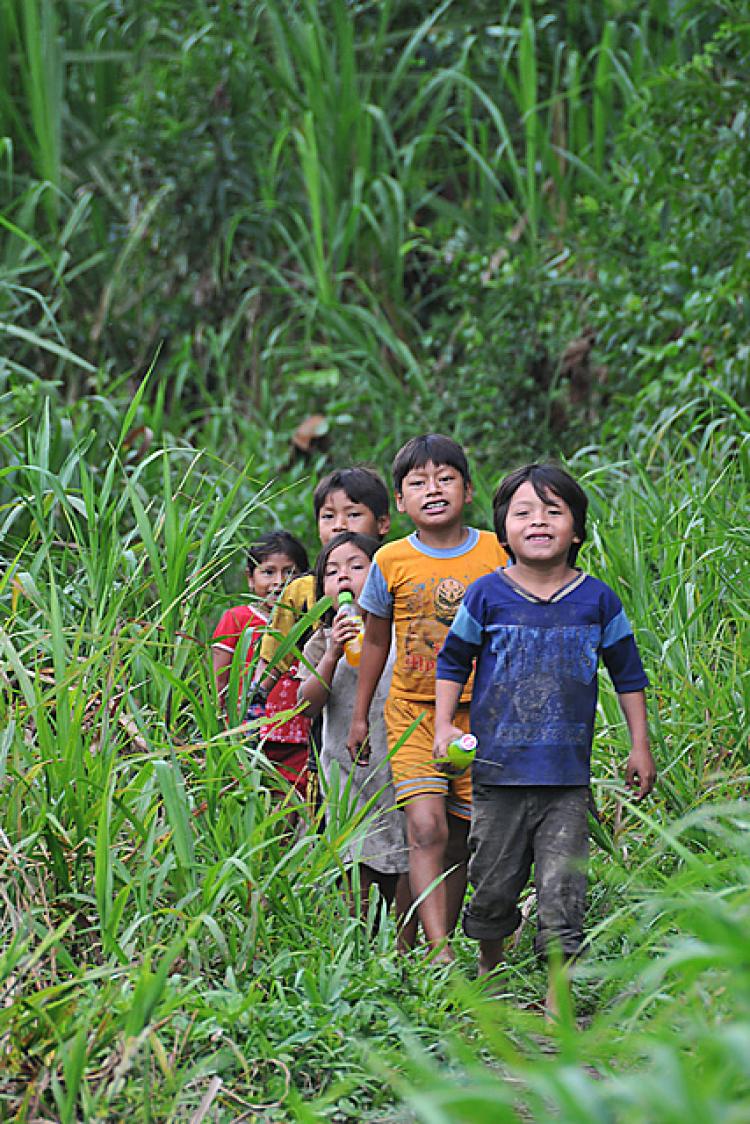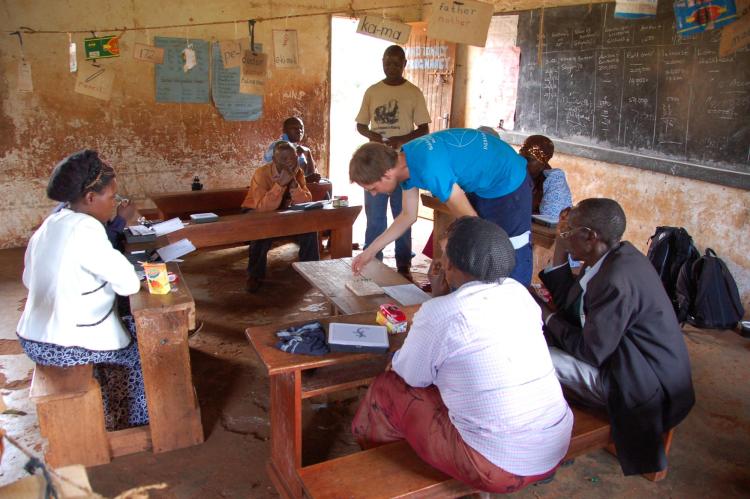Collective property rights spark spirit of cooperation that extends beyond managing land
When people come together to manage collectively owned natural resources like forests, they may become more cooperative and trusting overall, according to recent research led by CU Boulder.
The study takes a new look at what has become a growing trend around the world: Since the 1990s, groups like the Yuracaré of Bolivia and residents of the village of Mpunda in Uganda have fought for, and secured, collective property rights to the land they live on. Individuals don’t own this land. Instead, the communities own and manage wide swaths of woodlands together, deciding when to harvest or plant new trees free from most outside interference.
Previous studies have suggested that such agreements may be good for the environment—forests, in particular, may flourish under collective property rights.

Children explore a forest in the Yuqui Indigenous territory near the Chapare River of Bolivia. (Credit: Dan Beams)

A researcher guides residents of Nakalanga, Uganda, though a cooperative game. (Credit: Michail Pajak)
The new research, however, shows that such rights can also have much broader, although more subtle, impacts on people.
“We found that communities who got collective rights to their forests were able to improve how they interact with each other during forest-related activities, like harvesting trees,” said Komal Preet Kaur, lead author of the study and a doctoral student in political science at CU Boulder. “We would expect that. But they were also more cooperative around non-forestry activities, such as working on community projects, which was really surprising.”
Krister Andersson, co-author of the study and professor of political science, sees the findings as a rare bit of good news in the world of conservation. Collective land rights, in many cases, line up with how Indigenous peoples have interacted with and cared for natural resources for centuries.
“Environmental activists and scholars are really bad at paying attention to good news. We always ring the alarm bells,” Andersson said. “But one of the really positive stories when it comes to forests is that governments are increasingly recognizing the ancestral rights of Indigenous peoples to their lands.”
Building pride
The road to that recognition, however, can be long.
Take the Yuracaré. These Indigenous people live around the Chapare River of central Bolivia, a region of rich tropical forests where palm and wild cocoa trees abound. There, they harvest bananas and yucca and fish and hunt for game.
In the mid-1990s, following decades of activism from Indigenous groups, the Bolivian government passed a series of bills aimed at reforming the nation’s land rights. The government redistributed control of more than 65,000 square miles of land, much of it forested. Today, the Yuracaré oversee a 954-square-mile tract of forest and farmland. They make decisions about these resources through an assembly, which includes representatives from multiple “corregimientos,” or coalitions of neighboring families.
In the new study, Andersson and his colleagues set out to discover what kinds of impacts land reforms could have on the psychology of people like the Yuracaré.
“When you see a community that has engaged in all these struggles to get recognition, and then they are recognized by the national authorities, they present themselves in a whole different way,” Andersson said. “They carry themselves with more pride.”
Forestry games
The team gathered information on 213 groups living in 10 countries recorded in the International Forestry Resources and Institutions (IFRI) dataset. This resource, led by Indiana University and University of Michigan, includes data on how communities around the world manage their natural resources. Some of the communities held collective rights to forests, while others didn’t.
The researchers also traveled to Bolivia and Uganda where they invited local forest users to workshops where they played “behavioral games” to gauge their ability to solve a collective problem. Teams of eight people sat around a table stacked with wooden blocks representing trees in a shared forest. Over a series of rounds, they decided how many of these blocks to harvest. If too many of the players pursued short-term profits, the forest would disappear quickly.
“There's a tension,” Andersson said. “You have to decide: Do I go in and grab as many trees as I can to make a quick buck in the short term? Or do I try to cooperate with the others so that everyone wins?”
The researchers could easily spot the differences between the behavior of people who held the rights to their forests versus those who didn’t: Players from groups with colletive property rights were more cooperative during the game, on average. They talked over their agreements and plans and seemed to trust each other more.
Drawing on the IFRI dataset, the researchers also discovered that communities with collective land rights scored higher on several measurements of cooperation. They tended to collaborate more on community projects, such as maintaining roads or digging wells. In all, those communities were about 10% more cooperative when it came to non-forestry activities than groups without collective land rights.
For Kaur, the study shows that such collective property rights may be a good approach not just for protecting forests—but also for helping knit people together.
“Indigenous communities and local people who have been using these resources for generations have been disrupted because of colonialism,” she said. “It’s time the governments give their due rights back.”


